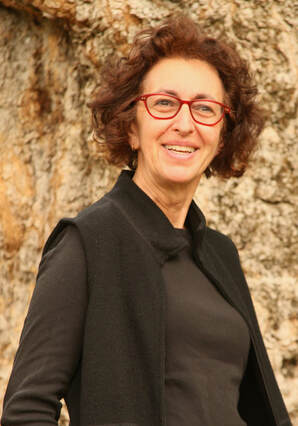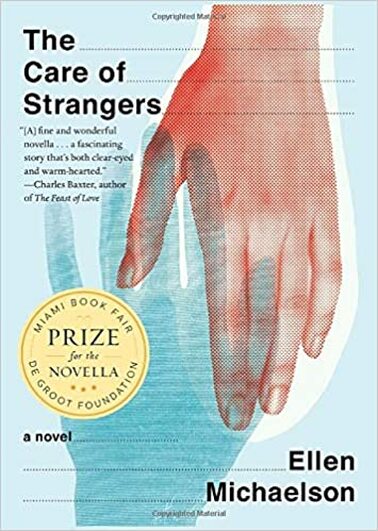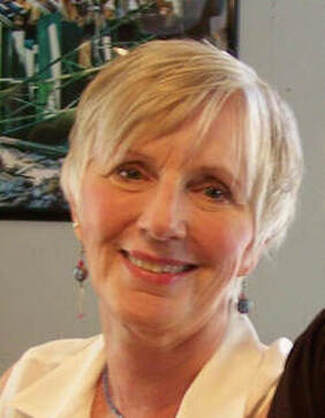|
Sue Staats interviews Ellen Michaelson, author of the prize-winning novel The Care of Strangers  Author Ellen Michaelson Author Ellen Michaelson This is a story of persistence, of a stubborn, decades-long search for solutions, and finally, of success. It’s also the story of a friendship, and a prophetic connection. Let’s start with the prophetic connection. Ellen Michaelson, our featured writer for March, won the Miami Book Fair/DeGroot Novella Prize in 2019. Her winning entry was The Care of Strangers, which was published in November 2020 by Melville House. The judge who selected The Care of Strangers was Justin Torres, author of We The Animals, a 2011 New York Times bestselling novel, recently made into a movie. As it happened, over nine years ago, in September of 2011, Justin was the featured writer at Stories on Stage Sacramento. Ellen, whom I had met at the Pacific University MFA program, was visiting, and we attended the event together. Ellen bought a copy of Justin’s book, and he inscribed it to her like this: “Ellen – can’t wait to be signing your book! Cheers! Justin Torres.” And nine years later…  In a perfect fairy tale ending, Justin Torres would have signed Ellen’s book, on stage, to the applause of the audience at the 2020 Miami Book Fair. But you can guess what happened: the Covid pandemic shut down the book fair and all the events had to be on line. But in his virtual presentation, Justin left no doubt of his opinion of Ellen’s work, or why he had selected it as the prize winner. "The Care of Strangers has so, so much heart. It's about touching, in so many ways... it is touching and it's about how we handle and care for each other. It's set in a hospital which functions as a microcosm, as a way to talk about the city, immigration, assimilation, poverty and the urgent needs of strangers stacked up on top of one another competing for resources. ..It so deftly handles character in the combination of reticence and moral clarity on the part of Sima. It's phenomenal. It moved me. It's a moving book... That's why I ultimately chose it as the winner." Before and after publication, similar accolades poured in. Charles Baxter (The Feast of Love) praised it as “a fine and wonderful novella,” Bonnie Jo Campbell (American Salvage, Once Upon A River) called it “wise and compassionate,” Natalie Serber (Shout Her Lovely Name) found it “gorgeous and clear-eyed.” Publisher’s Weekly called it a “subtle, touching debut,” and Booklist said “… this unlikely friendship and the understated emotional journeys of her main characters, depicting the reality of hospital life, and portraying patients make for a very engaging read.” Ellen’s winning this prestigious prize, and the publication of her book, were especially thrilling to me—because I’ve been reading pieces of The Care of Strangers for a long time. I met Ellen during our first residency at Pacific University’s MFA program, where we shared a faculty advisor for our first semester and both had big, messy, baby novels we were working on. Ellen’s eventually became The Care of Strangers, mine is somewhere in an obscure Word file, never finished. It’s this ability to stick with something for a long time that I’ve admired (and let’s be honest, envied) about Ellen. Her persistence and her ability to sustain both her writing practice and her medical practice are a testament to her wide-ranging abilities. Yes, Ellen Michaelson, writer, is also Ellen Michaelson, M.D. with a long-established medical practice in Portland, Oregon. Over the years we’ve talked about everything, but as well as I know her, I didn’t know much about the origin story of The Care of Strangers. So, in an exchange of e-mails and one long Sunday afternoon conversation, we began at the beginning. SUE: Ellen, I know when we met at the Pacific University low-residency MFA program, you’d been working on The Care of Strangers for a while, and that it was based on your experience as a medical intern. But that’s all I know. Take me back to the beginning. What was the spark that got you started? And had you always intended for it to be fiction? ELLEN: In 1993… SUE: 1993? That’s nearly three decades ago!
But I knew I wanted to write about the inside of this inner city hospital world and the intimacy between strangers: patient-doctor, patient-nurse, patient-orderly, orderly-nurse-doctor-xray tech. The patients' worldly wiles and audaciousness in the face of illness, poverty, and racism inspired me with their humanity and shaped me as a young doctor and still do to this day. When I first began to write, I had no intentions of writing a novel. But as patient episodes started to accumulate, it was clear I was writing a novel, and then I wasn't interested in writing anything but fiction. SUE: I believe The Care of Strangers is based on your experiences as a medical intern at Kings County Hospital in Brooklyn. So why did you choose to tell the story through the eyes of Sima, the orderly, rather than Mindy, the doctor? ELLEN: I wrote a story about going to identify my father's body at the morgue in NYC. It was written from the POV of a doctor. As I revised it, I happened to make a flip in diction and realized the narrator was an orderly. I wanted to be able to be critical of some things I had experienced, but at the same time I felt protective of my doctor world. I realized an orderly goes everywhere and sees everything and because of her lowly status, she would be free to say anything. Sima is also an immigrant, an outsider in all regards. SUE: And now I want to skip ahead a few years, to 2009, when you began the Pacific University MFA program. Did you enroll in hopes of getting the novel further along? ELLEN: Yes, I had over 300 pages, a beginning middle and end, a couple of people had read it and I couldn’t get more from the people I was working with. I went to school to learn how to make it work. SUE: Then you went on to work with a lot more people, and you thank them in your acknowledgements. But what made the book really come together? ELLEN: I’d submitted it to contests and agents, and I’d get feedback that they weren’t that connected to the narrator, that the through line wasn’t there. They’d talk about rising tension, and how something has to happen that makes the character change, the character has to face something and they can’t go back, they have to go somewhere different. And you know, I'd heard this over time, but it didn’t really sink in until I was at The Fifth Semester (a writing program with a focus on the practical) two or three years ago. There are certain things an MFA doesn’t teach you. You get critiqued but it’s about making beautiful sentences and not enough about what makes a book really work and what’s going to get it out in the world. We never talked about publishing, and that’s a bunch of crap because we all want to publish. The Fifth Semester focuses on the skills to get a book published and out in the world. Their attitude is, okay, you’ve got this stuff, what’s missing. The most important contribution they made was to really bug me about what would change Sima – Erin (one of the program founders) suggested the investigation about the death note Sima dictates and Mindy signs – and I said they wouldn’t do that in the real medical world. Why would they talk to an orderly? That probably wouldn’t have happened. But I used it. And if freed me from the years of minimalism, from the business of everything having to be description. Finally I just let my character just say it.
SUE: Why do you think you took so long to discover this? ELLEN: I resisted it for so long because I didn’t really want to hear structure. It was boring. I just wanted to write beautiful sentences. But if the sentences don’t go anywhere, who cares? SUE: And so all those wonderful characters come alive even more, because they mean something. You do have some memorable ones in The Care of Strangers – Mars the drug addict, Skinny the AIDS patient, the mysterious Tunnel Guy, Elevator Lady, Mrs. Sampson who has breast cancer, Miss Osborn who has an infection they can’t identify, The Shtroms, a Polish family Sima is called to translate for, even though she doesn’t speak Polish. Are these characters based on actual patients and co-workers? ELLEN: I don't recall anymore what is factual and what I made up. The characters are based on composites of the many patients and people I cared for and met. I took care of many drug addicts at KCH. I recall there was one who did reform, and another one who died waiting for heart surgery. There were many Haitians with AIDs, and fear among non-medical workers. I did overhear an oncology fellow bluntly tell a patient there was nothing he could do for her, and then abruptly walk away. Tunnel Guy - he's totally imagined. Elevator Lady, Miss Lawrence, definitely had a real life counterpart. SUE: In reading reviews of the book, it seems as if there’s a slight difference of opinion as to what it’s about. The DeGroot description says it’s about vulnerability and friendship, your bio says it’s about identity and finding a place for yourself in the world, Justin Torres said it was literally about touching, Charles Baxter says it’s about how the work of saving lives and saving oneself are closely related, Natalie Sperber says it’s about “illness and care, ambition and friendship.” What do you think it’s about? ELLEN: It's fascinating to hear the varied interpretations of what the book is about. This is an aspect of publishing a book I hadn't anticipated. The story is about many things and I've struggled with my "elevator pitch." It's about how we take care of each other in challenging times and how we get beyond our family's expectations to become who we can be and want to be. It's also about mother-daughter relationships and the immigrant experience. It's about grief and love. It's about hospital hierarchy. It's about female relationships in the workplace. Natalie Serber was interested in the way Sima, an orderly, supports Mindy, the person with the power, and Mindy accepts her support. Natalie called Sima a Janus figure. (Janus was the god of transitions, looking forward to the future and backward to the past.) Sima, an orderly, is transporting patients, Mindy, and herself on critical journeys of transition. SUE: So many of the issues Sima encounters or observes – anti-semitism, racism, the struggles of immigrants – seem as they could have occurred today. And yet the story takes place in the 1980s. Were you surprised at the political parallels? ELLEN: I started writing this book years ago, about health care of indigent people and one young woman's personal story. I was very surprised at the political parallels today. And on top of that COVID. It seems the perfect time for this book to come out in the world (other than the many limitations of launching a debut during a pandemic). SUE: One of your most enthusiastic reviews came from Rita Charon, Founder and Executive director of Narrative Medicine at Columbia, who says she intends to teach it in her courses. What is Narrative Medicine? And how would your book provide insight to a class at Columbia? ELLEN: Narrative Medicine is the practice of medicine in which we recognize, absorb, metabolize, and allow ourselves to be moved by the stories of illness and health. We hone our skills by reading fiction and poetry, and looking at art. We read, discuss, write, listen, and share. By listening to others' stories and telling our own, we respect and nourish those affected by illness. Narrative Medicine is now part of the curriculum in many medical schools.The aim is what Rita Charon calls a "new frame" to improve on the defects in the current medical world. My book investigates individuals listening to each others' stories and being moved to help them in one of the most challenging environments. Orderly Sima listening to patients, to Mindy, Sima and her mother, Sima and the Shtrom family. Strangers connecting with strangers. Learning to listen to stories of people we may not agree with, people very different from ourselves, is as vital as ever in these times, as we deal with COVID and poverty and structural racism. SUE: How do you integrate your writing life and your medical practice? It seems to me that they require quite a different mindset. ELLEN: What's different for me about medical practice and writing has mostly to do with attention and focus. A day in the office is filled with a list of patients to see, lab results to review, notes and orders to write in the EHR, queries from staff, calls from the ER when I'm on call. Listening to patients is at the core, but has to compete with all of this. It's listening to patients' stories that makes it all worthwhile. Am I hearing the right story? Does the patient feel I'm getting it? For fifteen yrs, I had my own "Narrative Medicine" practice where I saw each patient for thirty minutes. In the past year, in the small group I joined, I have been able to continue to see patients in thirty minute blocks. I schedule my writing time in the mornings and currently have two full days off every week. Switching gears to the quiet and attention to details on the written page is my biggest challenge. My success with that waxes and wanes. Still, it always feeds me and my capacity to listen and care about my patients. I love being part of the medical world (most of the time). And so I persist in both. SUE: One last question: if the Miami Book Fair had been held live, and you had met Justin Torres, what would you have said to him about your chance meeting ten years ago? ELLEN: I know, that’s one of my biggest regrets about not being able to attend in person. But what I would have said to him is this, "Justin, I was enthralled by We the Animals and devoured it at least three times. When I read you were the judge for the Miami Book Fair/de Groot Prize, my first thought was that you were the best reader for my book. You knew NY, poverty, struggle, the gritty complex side of life and love, what it means to be an outsider. To then be chosen by you was amazing, and so validating. My sister said of your comments at the opening of my Miami event, 'It doesn't get better than this!' When I get overwhelmed at getting The Care of Strangers out into the world, and summoning the inspiration to move on, I listen again to your words. I look forward to someday signing a copy of my book for you. Thank you, Justin. Some links if you’re interested in following up: Ellen Michaelson, Author https://www.ellenmichaelson.com/ Tom Spanbauer, writing teacher http://www.tomspanbauer.com/ The Fifth Semester, writing program https://www.the5thsemester.com/ Justin Torres https://www.justin-torres.com/ Miami Book Fair Ellen Michaelson https://www.miamibookfaironline.com/event/in-conversation-mbf-de-groot-prize-the-care-of-strangers/ Join Stories on Stage Sacramento March 26, 2021 - 5:00 pm, live via Zoom - for a performance of an excerpt from Ellen Michaelson's The Care of Strangers with actor (and SOSS casting director!) Jessica Laskey.
Purchase Ellen Michaelson's award-winning novel, The Care of Strangers.
Shop your favorite bookseller or one of the links below.  Sue Staats is a Sacramento writer. She directed Stories on Stage Sacramento for six years, from 2013 to 2019, and now contributes interviews and blog posts to the website, and cookies to the events (when they aren't virtual). She’s currently looking for a home for her short story collection and getting her feet wet in a couple of other projects, with the hope that eventually one of them will draw her into deeper waters. Sue's fiction and poetry have been published in The Los Angeles Review, Graze Magazine, Tulip Tree Review, Farallon Review, Tule Review, Late Peaches: Poems by Sacramento Poets, Sacramento Voices, and others. She earned an MFA from Pacific University, and was a finalist for the Gulf Coast Prize in Fiction and the Nisqually Prize in Fiction. Her stories have been performed at Stories on Stage Sacramento and Stories on Stage Davis, and at the SF Bay-area reading series “Why There Are Words.”
1 Comment
|
|
Who We AreLiterature. Live!
Stories on Stage Sacramento is an award-winning, nonprofit literary performance series featuring stories by local, national and international authors performed aloud by professional actors. Designated as Best of the City 2019 by Sactown Magazine and Best Virtual Music or Entertainment Experience of 2021 by Sacramento Magazine. |
|

 RSS Feed
RSS Feed
